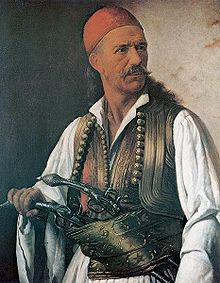
Klephts (/klɛfts/; Greek κλέφτης, kléftis, pl. κλέφτες, kléftes, which means "thieves" and perhaps originally meant just "brigand"[2]) were highwaymen turned self-appointed armatoloi, anti-Ottoman insurgents, and warlike mountain-folk who lived in the countryside when Greece was a part of the Ottoman Empire.[2][3] They were the descendants of Greeks who retreated into the mountains during the 15th century in order to avoid Ottoman rule.[4] Klepht bands also included many ethnic Albanians.[5] They carried on a continuous war against Ottoman rule and remained active as brigands until the 19th century.[4][6]
The terms kleptomania and kleptocracy are derived from the same Greek root, κλέπτειν (kléptein), "to steal".[7]
- ^ Dontas 1966, p. 24: "Born in 1800, Demetrios Makris, a kleftis, had succeeded his father to the kapetaniliki in the district of Zyghos. A simple yet very stubborn man, like Dimo - Tselios he was a great patriot."
- ^ a b Encyclopædia Britannica, Inc 1995, p. 564: "Other Greeks, taking to the mountains, became unofficial, self-appointed armatoles and were known as klephts (from the Greek kleptes, "brigand")."
- ^ Sowards 1989, p. 75: "Greek irregulars had operated as bandit klephts and anti-Ottoman insurgents since before the Greek War of Independence in the 1820s."
- ^ a b Cavendish 2009, p. 1478: "The klephts were descendants of Greeks who fled into the mountains to avoid the Turks in the fifteenth century and who remained active as brigands into the nineteenth century."
- ^ Erdem 2007, pp. 224–225: "He commanded the loyalty of the klepht bands, which had life styles similar to those of the Albanians and in fact included many ethnic Albanians."
- ^ Encyclopedia Americana 1919, p. 472: "KLEPTHS, klēfts (Greek, "thieves"). Greek bandits who, after the conquest of Greece by the Turks in the 15th century, kept themselves free in the mountains of northern Greece and Macedonia, and carried on a perpetual war against Turkish rule, considering everything belonging to a Turk a lawful prize."
- ^ Encyclopedia Americana 1919, "KLEPTOMANIA", p. 472.